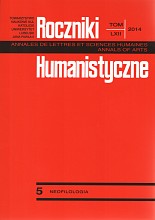Limitations on Zero Internal Arguments in Polish Verbal System: Transitives with Corresponding Derivatives in roz-
Limitations on Zero Internal Arguments in Polish Verbal System: Transitives with Corresponding Derivatives in roz-
Author(s): Anna Malicka-KleparskaSubject(s): Language and Literature Studies
Published by: Towarzystwo Naukowe KUL & Katolicki Uniwersytet Lubelski Jana Pawła II
Keywords: morpho-syntax; zero arguments; accomplishments; Slavic verb; prefixation
Summary/Abstract: The paper deals with the limitations on omitting internal arguments of roz- prefixed verbs in Polish. Various linguistic factors influencing the distribution of overt internal arguments are considered, such as specific structures rearranging valency, selectional restrictions of the relevant verbs, semantic frame membership, contextual considerations (anaphor, existential INIs), and the presence of a specific morphological exponent, out of which the last two will be shown to bear on the occurrence of zero arguments with roz- verbs. Among the prefixed verbs these with the causative meaning are accountable for on the basis of their morpho-syntactic structure, but the remaining ones constitute a mystery. For these verbs explanations proposing additional predicational structures are analyzed and discarded. Then we consider a proposal concerning the maximization of the event information, following Filip (2013). The proposal assumes the existence of a maximizing semantic operator which, among others, underlies the notion of perfectivity in Slavic languages. The operator may find its place in the lexical representation of roz- and account for the proposition’s reluctance to part with its internal argument.
Journal: Roczniki Humanistyczne
- Issue Year: 62/2014
- Issue No: 05
- Page Range: 97-111
- Page Count: 15
- Language: English

